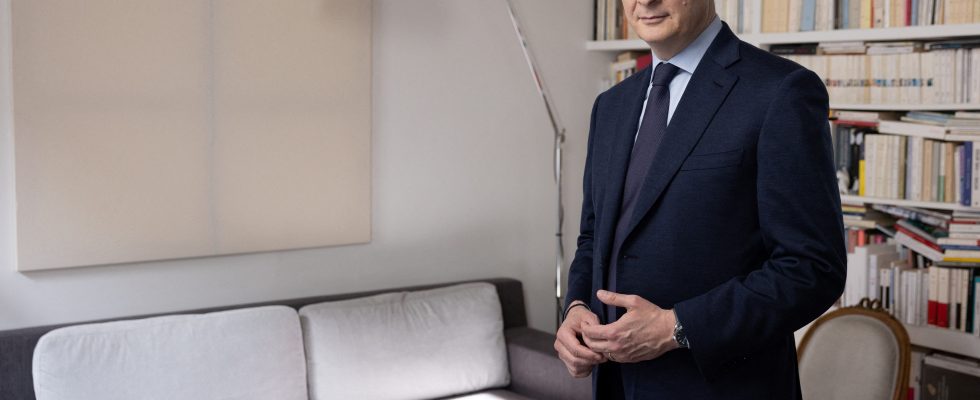A normalist with a classic look and a bit stuffy, an ardent and shameless feminist posing for Playboy… The government of Elisabeth Borne unites in the passion of writing two unrepentant graphomaniacs, and that everything seemed to oppose. The first, Bruno Le Maire, gives with his novel american fugue (Gallimard) his fifth book since joining Bercy in 2017. He is well ahead of his colleague Marlène Schiappa: eleven books in total over the same period!
If the works of the Secretary of State come more from the blog than from the Blanche de Gallimard collection, the two authors are part of the prestigious line of the minister writer, writing or publishing books while he is in office. André Malraux, in charge of Cultural Affairs, published in 1967 the first part of his cache memories. Closer to home, François Bayrou, barely appointed to the National Education in 1993, stands out with a laudatory biography of Henri IV, his model. Finally, the former mentor of “BLM” himself, Dominique de Villepin, is a talkative minister. At the head of the Quai d’Orsay in 2003, he delivers in his Praise of fire thieves, a feverish meditation on the poetic word. Before doing it again in 2005, once at Place Beauvau, with The European Manessay written with the Spanish writer Jorge Semprún.
Other examples of ministers, heads of state and city councilors combining the exercise of responsibilities and the publication of works exist abroad. In England, Boris Johnson, then mayor of London, in 2014 praised Churchill, his idol (Winston, Pocket book). First President of the Republic of Senegal (1960-1980), Léopold Sédar Senghor published collections of poems at the same time – but he had previously been Minister of the French Republic… A dual activity that is difficult to imagine in certain countries. “In Germany, I do not remember having seen this situation as a minister in activity and a writer, notes Hélène Miard-Delacroix, holder of the chair of history and civilization of contemporary Germany at the Sorbonne. low, one would consider that it is not compatible with the activity of a full-time minister.” A singularity that can be put to our credit. “There is great admiration in Germany for the French ability to be a man of letters and in political responsibility, continues the academic. Looking at Bruno Le Maire reinforces the image of a country with cultivated elites.”
Difficulty
Still, the tradition seems in danger. On social networks, Internet users are indignant: how does the great treasurer of Bercy find the time to write, while inflation is rising and public finances are in the red? “BLM” replies by insisting on the inner balance and the height of view that his passion for writing gives him. But the slightest discrepancy is scrutinized: an erotic passage in bad taste (“I’m dilated like never before”), spotted in american fuguearouses ridicule… As for Marlène Schiappa, the sales of her novel are mocked His way of being minepublished in 2021 by Stock: less than 500 copies according to Edistat.
If Le Maire’s testimonies behind the scenes of power (statesmen in 2007, days of power in 2013), published a posteriori, contributed to his notoriety, ministerial function and literary career seem incompatible today. Christophe Rioux, teacher-researcher at Sciences Po and specialist in the creative industries, observes: “In a country of literary essence, a minister who writes was, up to a point, rather perceived as an advantage. Today, in a context of crisis of representation, and demand for transparency, it is more difficult. A fortiori when one occupies, like Bruno Le Maire, a ministry of a technical nature”. Because of the freedom it requires, the novel is perhaps also a more risky genre than that of essays or memoirs.
Under these conditions, Le Maire’s literary career illustrates both the “permanence of this French tradition and its inevitable decline”, according to Bruno de Cessole. “All the school reforms since Giscard have led to a degradation of the cultural level. Literature is no longer at all a dominant model or admired for the younger generations”, laments the critic, who is preparing a book on the relationship between politics and literature of Montaigne to Mitterrand, to be published in August by Perrin.
Complementarity
Especially since pursuing a political and literary career at the same time, one risks losing on both counts… Glorious examples certainly exist, such as that of Malraux or, in England, Prime Minister Disraeli, whose novel Endymion appeared in 1880, the very year of his departure from Downing Street. But both had distinguished themselves by their talent as writers before exercising eminent functions. For Christophe Rioux, “literature is not made with good feelings, but explores areas of the human soul that are sometimes very dark. Hence a potentially significant discrepancy with the duty of political reserve. In addition, literature has reluctance with dual functions: if both are in the spotlight, and this is the case with politics, there is a risk that one engulfs the other.”
There is, however, a complementarity between the two domains which runs the risk of being regretted. Isn’t literature the best antidote to the technocracy that impoverishes public life? “Bruno Le Maire’s taste for literature contributes to the richness of the character. By contrast, the other members of the government are extremely smooth, a little gray. We would like to see them do something else, and be capable of it…”, sighs Jean -Christophe Rufin. As the publisher Benoît Yvert, a former member of Dominique de Villepin’s cabinet, reminds us, “literature helps politicians to see further”. Without her, would Villepin have made his famous speech at the United Nations?
